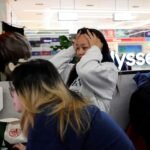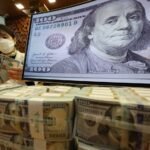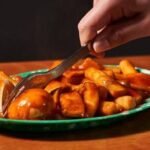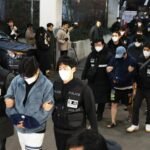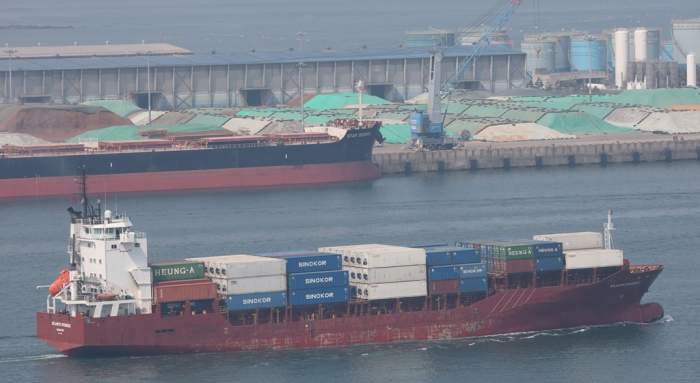
South Korea’s economy unexpectedly contracted in the first quarter as exports and consumption fell amid a political crisis and fears over the impact of aggressive US tariffs, fueling expectations for more monetary and fiscal stimulus.
Gross domestic product in Asia’s fourth-largest economy fell 0.2% in the January-March period from a quarter earlier on a seasonally adjusted basis, shrinking for the first time since the second quarter of 2024, the Bank of Korea’s (BOK’s) advance estimates showed on Thursday. That missed a market forecast of a 0.1% growth.
The sluggish data fueled expectations that the central bank will cut interest rates as early as next month and the government may seek an additional supplementary budget as US President Donald Trump’s tariffs are likely to push the trade-dependent economy into a recession.
“We expect the BOK to cut rates in May and by a total of 75 basis points (bps) by the end of the year,” said ING senior economist Kang Min Joo in a note.
“We expect the current government proposal of 12 trillion won ($8.4 billion) to increase slightly once passed before the presidential election. We see a greater chance of another supplementary budget after the election, with the size being much larger than the first one.”
South Korea is set for an early presidential election on June 3, after former President Yoon Suk Yeol’s impeachment stemming from his short-lived martial law declaration on Dec. 3, 2024.
The finance ministry proposed increasing the size of an envisioned supplementary budget to 12 trillion won from the initially proposed 10 trillion won to support key industry sectors.
EXPORTS DOWN
Exports fell 1.1% in the first quarter from the previous three months, logging the first decline since the third quarter of 2024, according to BOK data.
“The economy was sluggish in the first quarter even before the tariff shock was factored in,” said JPMorgan Chief Korea Economist Park Seok Gil. The investment bank slashed its 2025 growth forecast for the South Korean economy to 0.5% from 0.7%.
Overseas sales slid 5.2% in the first 20 days of April from a year earlier, separate customs data showed earlier this month, adding to concerns that Trump’s tariffs are biting into the South Korean economy.
Shipments to the US lost 14.3% during the period, while exports to China fell 3.4%. The world’s two largest economies are South Korea’s top overseas markets.
Exports of cars and auto parts slumped 6.5% and 1.7%, respectively as Trump has imposed 25% tariffs on imported vehicles since April 3.
South Korea is home to the world’s third-largest automaker Hyundai Motor Group with two carmakers – Hyundai Motor Co. and Kia Corp.
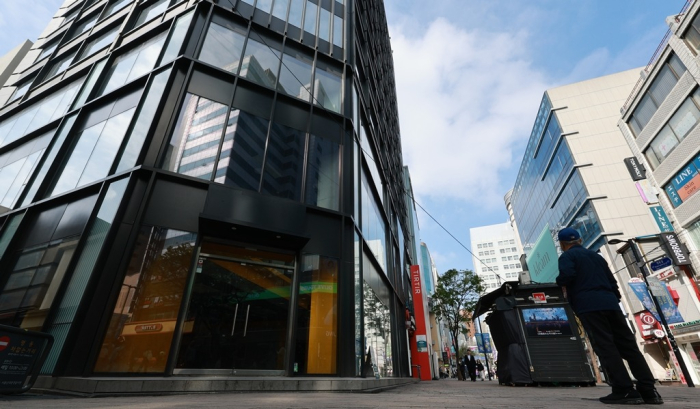
WEAK DOMESTIC DEMAND
Domestic demand weakened as the protracted political turmoil hurt sentiment among consumers and businesses.
Construction and facility investment dropped 3.2% and 2.1% in the first quarter, while private consumption fell 0.1% for the first time since the second quarter of 2024.
“The Korean economy is effectively in a medium- to long-term recession,” said Lee Junghoon, an economist at Eugene Investment & Securities Co.
“While the need for an active fiscal role is increasing, it is difficult to change many things with ad hoc policies. We expect the BOK to face more pressure for rate cuts.”
Lee said he has cut his economic growth forecast for this year to 0.7% from 1%, adding the economy is unlikely to expand by 1% with the current extra budget plan.
By Dong-Wook Jwa and Ik-Hwan Kim
leftking@hankyung.com
Jongwoo Cheon edited this article.

